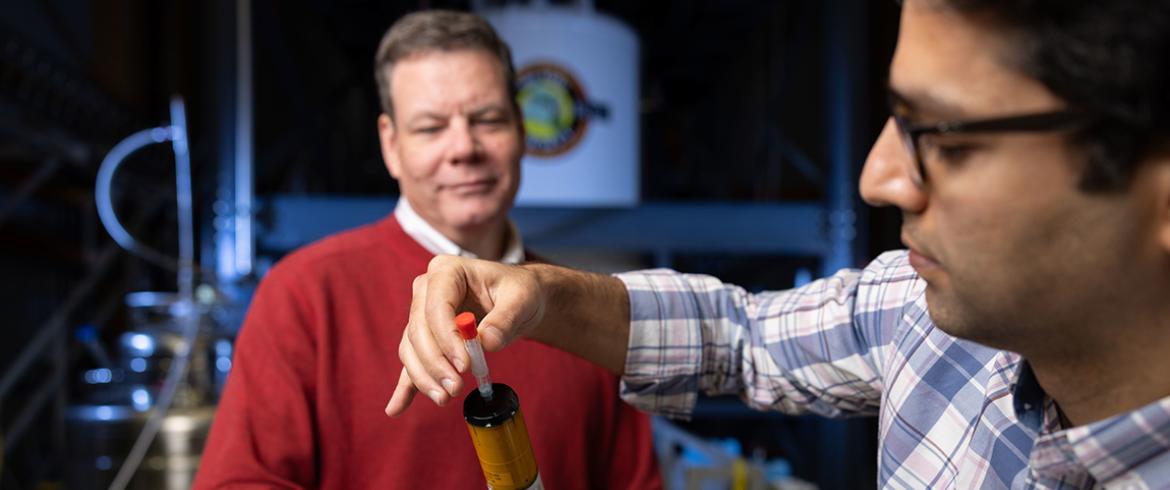
Engineering professors Sam Grant and Hadi Mohammadigoushki demonstrate a sample loaded into an NMR probe at the National High Magnetic Field Laboratory in Tallahassee, Fla. (M Schwartz/FAMU-FSU Engineering)
During the COVID-19 epidemic, monoclonal antibodies became a well-known and essential tool for treating the disease. Biologic therapeutics provide promising treatments for all kinds of infectious diseases. However, new research reveals problems that can affect product quality and shelf life.
Researchers at the FAMU-FSU College of Engineering and the National High Magnetic Field Laboratory are working with the National Institute of Health and the National Institute of Allergy and Infectious Diseases (NIAID) to study the problem.
“Air can get trapped in the IV bags used to dispense the product, or when administered by syringe the oil used in delivering the product can mix with the proteins in the therapeutic and alter its effectiveness,” Hadi Mohammadigoushki, a chemical and biomedical engineer professor at the college said. “These problems can happen during processing, transportation or when administering the medication and may compromise the therapeutics quality.”
Mohammadigoushki is leading the investigation with Sam Grant, a professor and fellow researcher at the nation's joint college and the NHMFL. The problem, the researchers say, is how monoclonal antibodies are structured. They adsorb air and oil, and this adsorption interferes with the molecule’s structure affecting the quality, safety, shelf-life and efficiency of the product.
“We are studying how the adsorption of these fluid-to-fluid interfaces affects the structure of these large proteins,” Mohammadigoushki said. “Once we understand this better, we can mitigate the risks in developing the therapeutics for various uses.”
The researchers are using high-field spatially and spectrally resolved Nuclear Magnetic Resonance (NMR) spectroscopy and other tools to assess the content and purity of a sample as well as its molecular structure. NMR-based diffusion techniques give a better understanding of bioenvironment interaction.
“The research at the NHMFL helps us assess the underlying adsorption kinetics,” Mohammadigoushki said. “By understanding the structure of monoclonal antibodies and their behavior, we can find solutions for safer, better therapeutics in the future. “
WHY IT MATTERS:
If successful, the outcomes of this research will advance our fundamental knowledge of monoclonal antibodies and their interactions with fluid-fluid interfaces. The study will help mitigate risks in developing these therapeutics for various applications.
WHO’S INVOLVED:
Sam Grant, a chemical and biomedical engineering professor at the FAMU-FSU College of Engineering, is a co-investigator working with Mohammadigoushki on the study. Several graduate students are working with the team.
WHERE’S THE MONEY COMING FROM:
The National Institute of Health and the National Institute of Allergy and Infectious Diseases (NIAID) fund the two-year, $414,313 study through Florida State University.
RELATED ARTICLES
Using 3D models to investigate bacteria movement
Engineering researchers awarded $3.3 million NIH grant for sodium-migraine connection research
Researchers Examine Role of Crucial Hormone and Exercise with $1.8M NIH Grant
